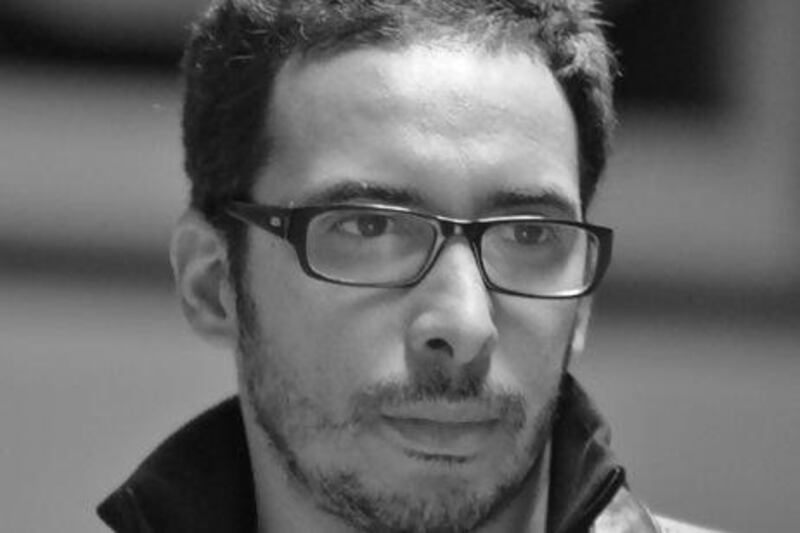Mounir Fatmi looks utterly exasperated. But there is a question I must ask. Last year, the Moroccan-born, France-based artist had one of his works removed from display in Toulouse when certain religious groups took exception to his use of the Quran in the piece. Shortly afterwards, Paris' Institut du Monde Arabe censored a video called Sleep (Al Naim) because it depicted Salman Rushdie. So does Fatmi willfully chase headlines?
"I'm not trying to," he says. "I don't expect my work to be censored and I definitely don't try to shock for the sake of it - that's not my thing. In fact, I'm surprised that it does. I mean, I am a Muslim myself. When I use the Quran in my work, what I'm trying to say is that this isn't just a religious book, it's a history book. It's a book which affects everything. I do understand that, you know?"
Fatmi is vexed because this should be a moment of great celebration. We're talking in London's Paradise Row gallery, the site of his first UK solo show, History Is Not Mine. Last month he was nominated for the prestigious Jameel Prize, the Victoria and Albert Museum's prize for contemporary art and design inspired by Islamic tradition, and he's contributed to biennials in Venice, Seville, Sharjah and Cairo, winning an award at the latter. Visitors to Art Dubai last month will have seen Fatmi's contribution to Sculpture on the Beach, a collection of red, white and blue poles that investigated attitudes towards America.
The London show is a fascinating sample of his work thus far. Fatmi knows, of course, that he will be scrutinised, and he immediately directs me towards an oversized circular saw blade from his Circles series, with writing from the Quran laser-cut into the side.
"I know that my pieces can shock people, but for me the battle is keeping them looking long enough for them to understand what I'm trying to say," he says. "So here, there is a saw, which can be bad - it can cut people, it's sharp. Yet on it is this beautiful calligraphy which talks about the uniqueness of God. So what I was interested in was how the Quran can be interpreted by different people in both violent and beautiful ways."
In fact, much of Fatmi's work is a tussle between conflicting ideas and cultures. One of the most successful pieces in this show is Dripping on Persian Carpet which, approached from one angle, is a striking Persian rug. But look at it head on and it's splattered with paint in an homage to Jackson Pollock. "People couldn't believe I'd defaced such a lovely carpet," Fatmi laughs. "But I like working on the border of things - a Persian carpet from Iran and an artist who in some way represents modern America. Having the two cultures just touching, as they often do, is interesting to me."
Of course, talk of Iran brings us to the elephant in the room, Salman Rushdie. The video work censored in Paris is shown in its entirety here, and whatever your views on The Satanic Verses, Sleep (Al Naim) is hardly a rabble-rousing piece. In it, a 3D rendering of Rushdie lies still, save for his chest rising up and down as he breathes, for six hours, the intention being to show the author living between life and death.
"I did have many of my friends ask me what I thought I was doing," Fatmi admits. "They asked me why I wanted to create a problem for myself. My attitude was this: if he was killed, then as a Muslim I would personally feel guilty about this. My view is that if you don't like his books, don't buy them. Don't read them. If one man has different views to your own, that doesn't have to harm your personal beliefs."
Thankfully, perhaps, not everything in the show is so controversial. Without History is a series of poles used in equestrian competition inscribed with The Art of War, which has influenced everything from combat to business. "When I first came across it, I found it really powerful. I mean, this is a text which is used as one of the tenets of Wall Street. And yet look what's happened there in recent years. So this is all about something which ostensibly looks very solid - a big wooden pole - but is fragile at the same time. It can fall."
Which, in a funny way, sums up Fatmi and his work. It's obvious that he is not an artist who enjoys being censored. Notoriety is not his driving force - Fatmi is simply inquisitive about the world around him and chooses to try to understand it through art.
"You know, it's funny living in France," he smiles. "When anyone has a problem with me, I'm a Moroccan artist. When they want to celebrate my achievements, I'm French."
Judging by History Is Not Mine, he'll be French for the foreseeable future.
History Is Not Mine is on show at Paradise Row, London, until June 1. Visit www.paradiserow.com
Follow us
[ @LifeNationalUAE ]
Follow us on Facebook for discussions, entertainment, reviews, wellness and news.





